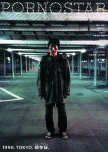It's Got a Certain Hipster Nihilism, But It Works
Let it be said that "Tokyo Rampage" is largely about style. Now, this could easily mean that a movie is superficial. However, the style here is slickly appealing and, moreover, part of the movie's theme about socio-cultural vacuity. In short, it works.
As for the story itself, there's a certain hipster nihilism which would -- just like the movie's surfeit stylishness -- seem a negative element. Yet, no, it's actually handled in a way that's purposeful and, hence, intriguing. Indeed, I enjoyed the ride because I had decided early on that the inscrutable, psychopathic lead's maddeningly repeated line, "Not needed," made him the homicidal cousin to Bartleby in Herman Melville's famous short story, "Bartleby the Scrivener." I am referring, of course, to the inscrutable Bartleby's maddeningly repeated line, "I prefer not to."
Like Bartleby, this character is a blank, and his mission to murder every "Not needed" person in his path does not make us hate him, because one cannot hate a blank space. Meanwhile, the audience is intended to empathize with the other lead, the psychopath's boss (the one sympathetic character in the whole movie), and for the boss the line, "Not needed" eventually begins to register as an existential crisis.
The viewer, just as the boss, begins to squirm under the same frustrating fear and bewilderment each time they hear the line, "Not needed." It's when you realize that you are just as effected by this line as he is that you also realize, son of a bitch, this bizarre, disturbing movie worked. In other words, it achieved precisely what it had set out to achieve.
Oh, and watch for the visuals -- such as the bathes of tomatoes, the swooping down of death crows, and the falling of knives. But especially the falling of the knives. That scene is worth the whole movie alone.
As for the story itself, there's a certain hipster nihilism which would -- just like the movie's surfeit stylishness -- seem a negative element. Yet, no, it's actually handled in a way that's purposeful and, hence, intriguing. Indeed, I enjoyed the ride because I had decided early on that the inscrutable, psychopathic lead's maddeningly repeated line, "Not needed," made him the homicidal cousin to Bartleby in Herman Melville's famous short story, "Bartleby the Scrivener." I am referring, of course, to the inscrutable Bartleby's maddeningly repeated line, "I prefer not to."
Like Bartleby, this character is a blank, and his mission to murder every "Not needed" person in his path does not make us hate him, because one cannot hate a blank space. Meanwhile, the audience is intended to empathize with the other lead, the psychopath's boss (the one sympathetic character in the whole movie), and for the boss the line, "Not needed" eventually begins to register as an existential crisis.
The viewer, just as the boss, begins to squirm under the same frustrating fear and bewilderment each time they hear the line, "Not needed." It's when you realize that you are just as effected by this line as he is that you also realize, son of a bitch, this bizarre, disturbing movie worked. In other words, it achieved precisely what it had set out to achieve.
Oh, and watch for the visuals -- such as the bathes of tomatoes, the swooping down of death crows, and the falling of knives. But especially the falling of the knives. That scene is worth the whole movie alone.
Cet avis était-il utile?

 1
1



















